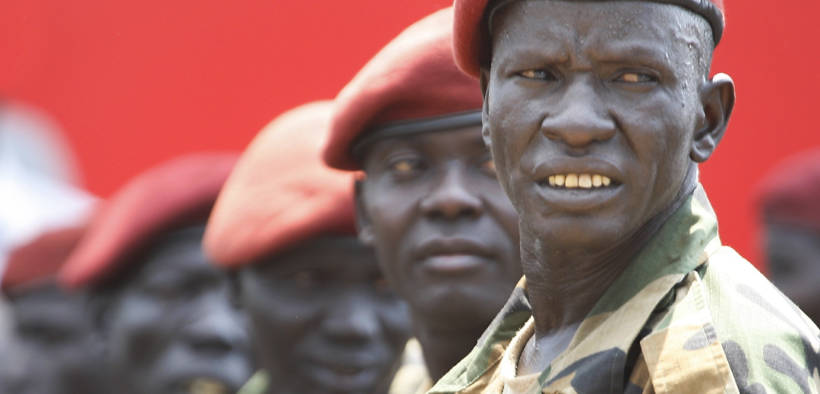South Sudan Struggles to Form Government Amid Continued Internal Conflict

After signing a peace deal last year to end South Sudan’s six-year-long civil war, the country is still struggling to form a transitional government.
Violent clashes were reported Thursday in South Sudan, leaving two people dead and more than a dozen injured. Clashes broke out when a United Nations peacekeeping force attempted to prevent an altercation between local South Sudan youth, believed to have been intoxicated, and other local residents in the town of Bentiu.
The U.N. mission, tasked to protect civilian sites in South Sudan and known as POCS, provides safe shelters for people affected by the local conflict. “It is unacceptable for members of the local community to engage in violence against each other and against peacekeepers, who work relentlessly to provide protection to vulnerable displaced families,” the U.N. mission said in a statement.
Local Reactions
In reaction to the latest violence in the troubled region, representatives of the Sudan People’s Liberation Army, known as SPLA, met with family chiefs at the U.N.-protected site on Sunday.
The representatives expressed strong condemnation of the violence between the youth and other displaced people, as well as U.N. personnel, who had a number reportedly wounded. The SPLA delegation pledged to bring the perpetrators to justice.
Shortly after the incident, U.N. civilian staff members offered condolences to the family of one of the victims. During their visit to the family, several youth reportedly attacked the U.N. staff violently and set their vehicle on fire. A statement by the U.N. mission peacekeeping staff said perpetrators threw stones and Molotov cocktails. One of the bombs set the vehicle on fire. According to Relief Web, the U.N. mission has embarked on a probe into the riots, which caused the death of two young men and injured several others, including U.N. staff members.
When civil war broke out in South Sudan in 2013, the U.N. helped erect some protective sites to provide safe shelter for civilians who fled the violence. A United Nations news website reported that as of Nov. 7, a total of 190,455 civilians have been already been sheltered in various protective sites served by the U.N. mission. Bentiu, alone, has provided sanctuary for 177,767 civilians, making up the largest population across the young state of South Sudan.
An Attempt to Resolve the Conflict
Last September, both South Sudan President Salva Kiir and rebel leader Riek Machar agreed to form a transitional government by the middle of November.
The announcement came just weeks after South Sudan’s neighbor to the north, Sudan, which South Sudan split away from in 2011, formed its own transitional government after ending the 30-year-long presidency of Omar Al Bashir.
The Minister of Information in South Sudan Michael Makuei Lueth told reporters the parties discussed some “minor issues” and “mutual principles” as the basis for a transitional government, planned to be established by Nov. 12.
Last year, both sides signed a deal that put an end to a civil war that claimed the lives of hundreds of thousands of people and forced a third of the population out, as well as ruined the country’s economy.
US Weary of Sudan Delays
In the meantime, Bryan Hunt, director of the office of Sudan and South Sudan with the U.S. State Department, said last October at the U.S. Institute of Peace that his administration does not want to continue to hear arguments for why more time is necessary to form a coalition government. The high-ranking American official was referring to failure by the various warring parties of Sudan, to reach a compromise over a long-standing, community-based conflict.
“If a national unity government is not formed by Nov. 12, we are going to reconsider our relationship with South Sudan,” he said. However, Hunt maintained that the U.S. is not likely to consider imposing sanctions on South Sudan’s economy, including oil, noting that the people of South Sudan may be affected badly since they are partly dependent on foreign aid for survival.
The senior official did not, though, indicate what sanctions the American administration would impose on South Sudan, in case the country did not achieve a national unity government.
The Youngest State
South Sudan, labeled as the youngest sovereign state in the world, was established in 2011, following more than two decades of conflict with the regime of the recently deposed Sudanese dictator president, Omar al-Bashir.
Since then, the new state has been fraught with internal conflict and descended into a war between the state’s President Salva Kiir and his former Vice President Riek Machar, leading to the starvation and abuse of millions of people, including sexual mutilation and murder. Kiir accused Machar of plotting a coup against him in 2013, leading to the conflict between the two sides. Machar denied the allegations. The two sides have now agreed to a peaceful solution but have yet to find agreeable terms.







